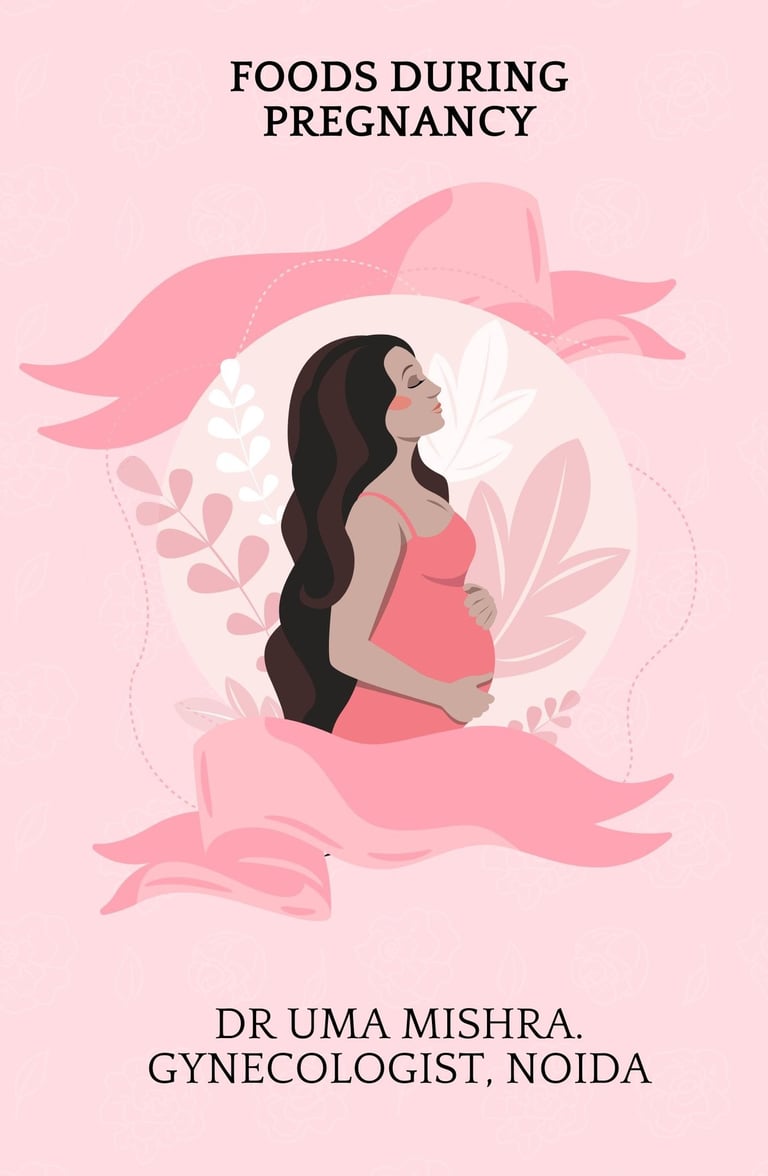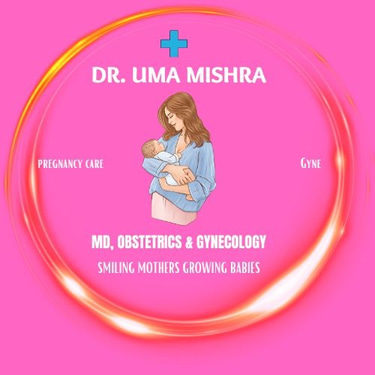Diet Charts to include food you require in pregnancy by gynecologist in Noida
Eating a healthy and well-balanced diet during pregnancy is essential for the health of both the mother and the growing fetus. This article provides a comprehensive diet chart for expecting mothers that includes essential nutrients and foods to ensure optimal nutrition. The article also highlights the importance of staying hydrated and avoiding processed foods and sugars during pregnancy. Dr Uma Mishra, Gynecologist in Noida explains it beautifully.
Dr Uma MIshra, Gynecologist in Noida
4/19/20236 মিনিট পড়ুন


Essential Nutrients during pregnancy and ideal diet charts for expecting mothers:
What are the essential nutrients during pregnancy? Do you have a preferred Diet Chart duly endorsed by your Gynecologist. Leading Gynecologist in Noida, Dr Uma Mishra, discusses, what all nutrients are required and how you can include them through diet.
Pregnancy is a time of significant changes for a woman's body, and it is essential to consume a healthy and balanced diet to support both the mother's and baby's nutritional needs.
A balanced diet during pregnancy should include a variety of nutrient-dense foods that provide essential nutrients such as protein, iron, folate, calcium, and omega-3 fatty acids. Let us look at the essential nutrients that pregnant women should consume:
Protein: Protein is essential for the growth and development of the fetus. Vegetarian mothers can consume protein from sources such as beans, lentils, tofu, nuts, and dairy products (if not vegan).
Iron: Iron is necessary for the production of hemoglobin, which carries oxygen to the fetus. Vegetarian mothers can consume iron from sources such as beans, lentils, spinach, fortified cereals, and dried fruits.
Folate: Folate is necessary for the healthy development of the fetal nervous system. Vegetarian mothers can consume folate from sources such as leafy greens, fortified cereals, beans, and lentils.
Calcium: Calcium is necessary for the development of the fetal bones and teeth. Vegetarian mothers can consume calcium from sources such as dairy products (if not vegan), fortified plant-based milks, leafy greens, and tofu.
Omega-3 fatty acids: Omega-3 fatty acids are essential for the development of the fetal brain and eyes. Vegetarian mothers can consume omega-3 fatty acids from sources such as flaxseeds, chia seeds, walnuts, and algae-based supplements (if not vegan).
On an average, the requirements during different months are as follows:
First Month:
During the first month of pregnancy, there is no significant increase in nutrient needs. However, it is important to start taking a prenatal vitamin with folic acid to reduce the risk of neural tube defects.
Second and Third Month: During the second and third months of pregnancy, the calorie requirement increases by about 300 calories per day. Protein requirements also increase to support the growth of the placenta and fetus. Carbohydrate requirements remain the same, but it's important to choose healthy carbohydrates such as whole grains, fruits, and vegetables. Iron and folate requirements also increase during this time.
Fourth to Sixth Month: During the fourth to sixth months of pregnancy, the calorie requirement increases by about 350-450 calories per day. Protein, carbohydrate, and fat requirements also increase to support the growth and development of the fetus. Iron, calcium, and vitamin D requirements also increase during this time.
Seventh to Ninth Month: During the seventh to ninth months of pregnancy, the calorie requirement increases by about 450-500 calories per day. Protein requirements continue to increase, and it's important to consume enough healthy fats for brain development. Calcium and vitamin D requirements also increase during this time to support bone growth.
Here are some general guidelines for nutrient requirements during pregnancy:
Calories: 300 extra calories per day during the second and third trimesters, and 450 extra calories per day during the last trimester.
Protein: 70-100 grams per day.
Carbohydrates: Focus on healthy carbohydrates such as fruits, vegetables, and whole grains.
Fat: 20-35% of daily calories should come from healthy fats.
Vitamins and Minerals: Prenatal vitamins can help ensure you're getting enough of essential vitamins and minerals such as iron, folic acid, calcium, vitamin D, and omega-3 fatty acids.
It's important to note that every woman's nutrient requirements may vary based on her individual needs, weight, and health status. It's always best to consult with a healthcare professional for personalized nutrition advice during pregnancy.
Pregnant mothers frequently ask their Gynecologist about the sample diet chart for each month of pregnancy for vegetarian, non-vegetarian, and mothers who consume eggs. Well, mostly diets are recommended trimester wise and sample diet charts are provided herewith. However, please note that various factors such as Allergy, your risk factors during pregnancy, etc., ,may be discussed with the Gynecologist so that you firm up your Diet Chart.
Diet chart for each month of pregnancy for expecting mothers consuming egg and other vegetarian products:
First Trimester (Weeks 1-12):
Breakfast:
1 cup of milk or yogurt
1 whole-grain bread or 1 small dosa with chutney or sambar
1 small bowl of fruit salad (such as papaya or pomegranate)
Mid-morning snack:
1 small bowl of mixed fruit (such as grapes, oranges, and kiwi)
1 handful of nuts (such as almonds or walnuts)
Lunch:
1 cup of cooked rice or roti
1 cup of dal (lentils) or paneer (cottage cheese) curry
1 cup of mixed vegetables (such as beans, carrots, and potatoes)
1 small bowl of salad (such as cucumber, tomato, and beetroot)
Afternoon snack:
1 cup of vegetable soup (such as pumpkin soup)
2 whole wheat crackers
Dinner:
1 cup of cooked quinoa or millets
1 cup of mixed vegetable curry (such as baingan bharta or palak paneer)
1 small bowl of salad (such as grated carrots, tomatoes, and onions)
1 cup of yogurt or buttermilk
Bedtime snack:
1 glass of warm milk with a pinch of cardamom powder
Second Trimester (Weeks 13-28):
a sample diet chart for a vegetarian pregnant woman from India that includes cereals, fruits, and vegetables, along with other food items as required, especially during the second trimester:
Early Morning:
1 glass of warm water with honey and lemon
Breakfast:
2 multigrain chapatis with paneer bhurji/ vegetable omelet/ tofu scramble
1 bowl of fruit salad (papaya, apple, banana, orange, etc.)
1 glass of milk with a handful of almonds
Mid-Morning Snack:
1 bowl of vegetable soup/ tomato soup/ lentil soup
1 fruit (pear, guava, kiwi, etc.)
Lunch:
1 bowl of brown rice/ quinoa with mixed vegetable curry (carrots, beans, capsicum, potato, etc.)
1 bowl of dal/ rajma/ chhole/ chickpeas
1 bowl of cucumber raita/ curd
1 small bowl of salad (carrot, cucumber, beetroot, tomato, etc.)
Evening Snack:
1 cup of green tea with a handful of roasted chana/ makhana/ nuts/ seeds
1 whole grain bread toast with hummus/ peanut butter/ avocado spread
Dinner:
1 bowl of mixed vegetable soup/ clear vegetable soup
2 multigrain chapatis with paneer tikka masala/ palak paneer/ mushroom curry/ soybean nuggets curry
1 bowl of mixed vegetable salad
Before Bed:
1 glass of warm milk with a pinch of turmeric and honey
It is essential to consult a Gynecologist to personalize your diet chart according to your specific needs and preferences, risk factors during pregnancy, etc. Also, make sure to stay hydrated by drinking plenty of water, coconut water, buttermilk, and other healthy beverages throughout the day.
Third Trimester (Weeks 29-40):
Early Morning:
1 glass of warm water with honey and lemon
Breakfast:
2 multigrain chapatis with paneer bhurji/ vegetable omelet/ tofu scramble
1 bowl of fruit salad (papaya, apple, banana, orange, etc.)
1 glass of milk with a handful of almonds
Mid-Morning Snack:
1 bowl of vegetable soup/ tomato soup/ lentil soup
1 fruit (pear, guava, kiwi, etc.)
Lunch:
1 bowl of brown rice/ quinoa with mixed vegetable curry (carrots, beans, capsicum, potato, etc.)
1 bowl of dal/ rajma/ chhole/ chickpeas
1 bowl of cucumber raita/ curd
1 small bowl of salad (carrot, cucumber, beetroot, tomato, etc.)
Evening Snack:
1 cup of green tea with a handful of roasted chana/ makhana/ nuts/ seeds
1 whole grain bread toast with hummus/ peanut butter/ avocado spread
Dinner:
1 bowl of mixed vegetable soup/ clear vegetable soup
2 multigrain chapatis with paneer tikka masala/ palak paneer/ mushroom curry/ soybean nuggets curry
1 bowl of mixed vegetable salad
Before Bed:
1 glass of warm milk with a pinch of turmeric and honey
Also, make sure to stay hydrated by drinking plenty of water, coconut water, buttermilk, and other healthy beverages throughout the day.
Further, If you are required to include High-Protein items, include any one of the following:
One bowl of dal or lentils for lunch or dinner
One bowl of Greek yogurt or cottage cheese (paneer) with vegetables for lunch or dinner
One small bowl of mixed nuts and seeds (such as almonds, cashews, walnuts, pumpkin seeds, and sunflower seeds) as a snack
One cup of cooked quinoa or brown rice with vegetables for lunch or dinner
One bowl of boiled chickpeas or kidney beans for lunch or dinner
One glass of protein-rich smoothie made with milk or soy milk, banana, and peanut butter as a snack or breakfast option.
Dr Uma Mishra, MD, Gynecologist is one of the best gynecologists in Noida. Her clinic is at Sector-75, Noida. You may consult her online or at clinic for customized Nutritional plans and Supplements.
